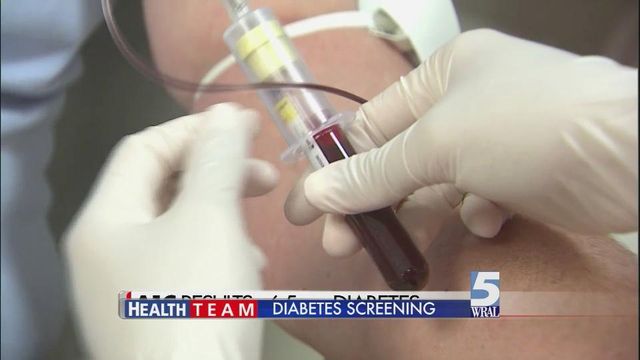Options exist for screening, preventing diabetes
The risk of heart attacks, strokes, blindness, kidney disease or even amputations dramatically increases for people with diabetes.
Posted — UpdatedThe risk of heart attacks, strokes, blindness, kidney disease or even amputations dramatically increases for people with diabetes.
Doctors say there are a few screening options, but one of the best ways is for people to know their own risk.
Diabetes has been called a "metabolic cancer." It causes a wide range of serious medical problems that are in many ways worse than most cancers. The disease may be prevented, though.
Risk factors that can be controlled include:
– Being overweight or obese
– High blood pressure
– A physically inactive life style
– Gestational diabetes, and delivering a baby over 9 pounds
– A family history of diabetes
– Being 45 years of age or older.
UNC Diabetes Unit Chief Dr. John Buse says there are three approved tests for diabetes, including "fasting blood sugar" with a simple finger prick.
"And it has its clear advantage," Buse said. "It's dirt cheap."
There's also a glucose tolerance test, which involves three days of preparation before a blood draw.
"So, it takes a bit of time," Buse said. "It's complicated. It's the most burdensome."
A blood draw is also required for a test called A1C.
"The big advantage to the A1C test is you don't have to be fasting," Buse said.
The test is done in one place, at one time, which makes it more likely people will get the screening.
"So, I personally think the A1C test is the best screening test for diabetes," Buse said. "If your value is over – 6.5 or over – you have diabetes. If it's between 5.7 and 6.4, we call that pre-diabetes, and you should get on a diet and exercise program to try and lose 5 to 10 percent of your body weight."
Losing that much weight could decrease the risk of developing diabetes by 60 percent.
The American Diabetes Association recommends routine screening of adults at age 45, especially for people who are overweight or obese.
People who have a family history of diabetes, gestational diabetes or symptoms of diabetes like frequent urination or excessive thirst should be screened as well.
The A1C screening test reveals blood sugar levels over a two- to three-month period of time, not just at the time of the screen.
The take home message? Know the risk factors of diabetes, and speak with a doctor.
• Credits
Copyright 2024 by Capitol Broadcasting Company. All rights reserved. This material may not be published, broadcast, rewritten or redistributed.





